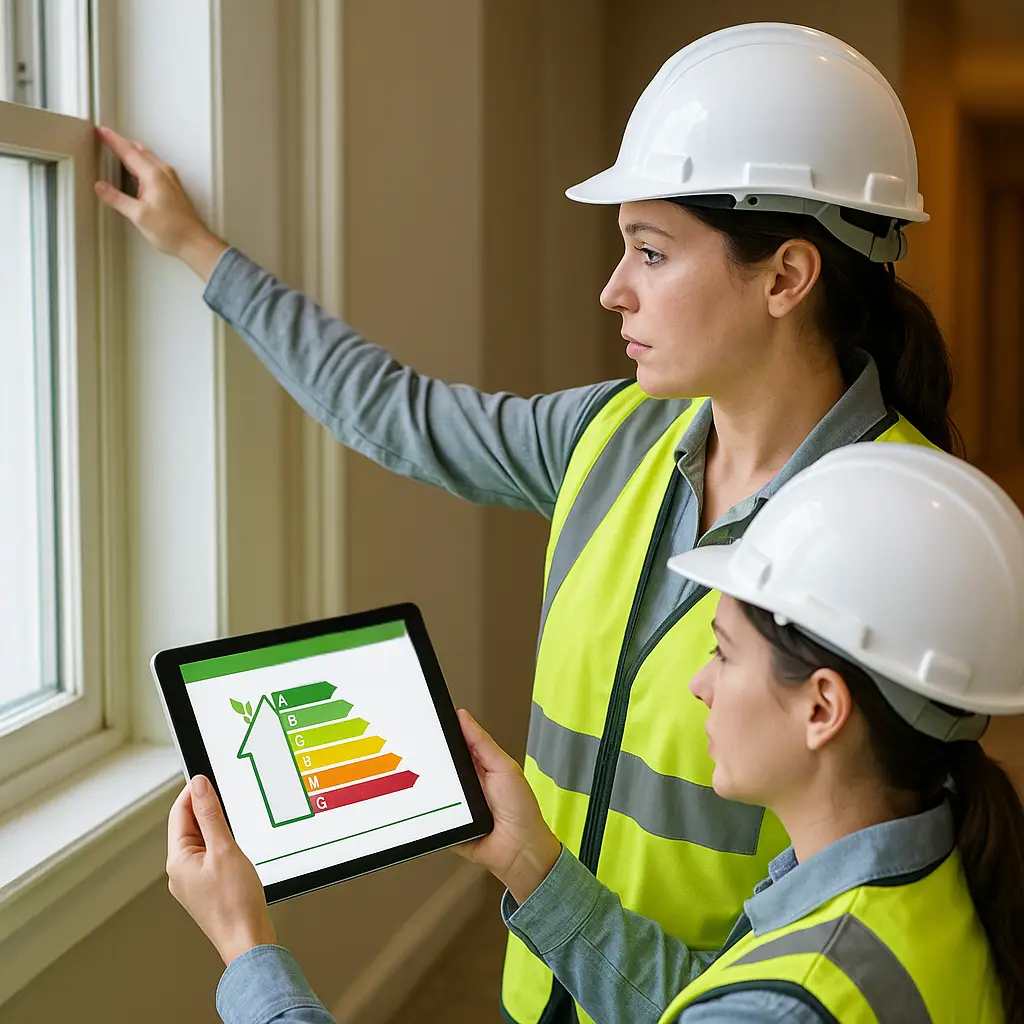Why EPC Assessments Matter for Your Property
Energy Performance Certificates (EPCs) are essential for anyone planning to sell, rent or build a property in the UK. They tell you how energy-efficient a building is on a scale from A (very good) down to G (not great at all). The certificate also gives tips on how to lower energy use and save money.
At Ratio Seven, we work closely with property owners, landlords, architects and developers to help them through the EPC assessment process. With certified energy assessors, we ensure each assessment follows the strict standards set by the government. Whether it’s an existing home or a new build, we help make your property more energy-conscious and legally compliant.
What an EPC Covers
Many people think an EPC is just another piece of paper, but it’s a detailed report. When we carry out an EPC assessment, we inspect everything from insulation and heating systems to double glazing and lighting. It’s not just about ticking boxes; we give you a real look at how your property uses energy.
The assessment also includes a set of suggestions. These might be as easy as switching to LED bulbs or more involved, like replacing an old boiler. The recommendations guide you on what you could improve if you wanted to reach a better energy rating.
For landlords, it’s not just useful, it’s the law. Since 2018, properties must have at least an E rating before they can be let out. That’s where an up-to-date EPC becomes important, especially if you’re planning to sell or rent.
Why You Need Certified Assessors
Let’s be honest. Not all EPC assessors are the same, and how well your certificate is done makes a difference. At Ratio Seven, our team of certified energy experts has deep knowledge of the Building Regulations and government standards. That means we assess your property properly, using reliable data and calculations.
We don’t cut corners. Our assessors have been trained to handle different property types, from modern flats to large detached homes. That gives our customers peace of mind knowing their EPC has been done the right way.
If your property needs SAP calculations as well, for example, if it’s a new build or heavily altered dwelling, we can also help. You can view our SAP calculations for new builds page to learn more about what’s involved.
Tools We Use During the EPC Assessment
During an EPC assessment, we look at several parts of your property to work out how energy is used.
This includes:
- Wall and loft insulation
- Boiler type and age
- Double or single-glazing
- Lighting (bulbs and fittings)
- Heating controls like thermostats and timers
We also use clever software to run the numbers. This gives a final score and grade for your property. The software looks at overall energy use and carbon emissions, helping us give a full and honest view.
If you’re building a new home or altering an old one, this process links nicely with our SAP assessments. Our SAP assessors calculate theoretical energy use and emissions. It might sound technical, but we make the results easy to understand.
You can find more details in our helpful SAP calculations FAQs.
What Makes a Property Energy-Efficient?
You don’t need to be an engineer to understand how a property can use less energy. We often advise our customers on simple ways to improve before or after they receive their EPC.
Here are some areas that make a big difference:
- Insulation: Good insulation keeps heat in longer, so your heating doesn’t need to work overtime.
- Windows: Double or triple-glazed windows keep draughts out and heat in.
- Heating Systems: New boilers or heat pumps work better and cheaper than older ones.
- Lighting: Energy-saving light bulbs use a lot less power.
Properties that take these steps often achieve higher EPC ratings, which can help with market value, too. At Ratio Seven, we’re honest about what changes are worth your time for resale or rental appeal.

FAQs
How long does an EPC assessment take?
Usually between 30 and 60 minutes, depending on the size of the building. Bigger houses or buildings with more rooms may take slightly longer.
How long is an EPC valid for?
An EPC is valid for 10 years from the date of issue, but you can get a new one at any time, especially if you’ve made improvements.
Do listed buildings need EPCs?
In some cases, listed buildings might be exempt. But it depends on what changes have been made. We can guide you through it with the right advice.
How can I improve my EPC rating?
Simple steps like adding insulation or fitting an energy-efficient boiler can improve your score. Our assessors will let you know what works best for your type of property.
Do I need a new EPC if I renovate?
Yes, especially if the changes affect heating, insulation, or how energy is used. Renovations can shift your rating up or down, so it’s smart to reassess.
SAP Assessments for New Builds and Conversions
If you’re planning to build or refurbish, you’ll likely need a Standard Assessment Procedure (SAP) calculation. It’s not the same as an EPC, but it’s closely linked. SAP assessments use numbers and formulas to predict how much energy a property will use once built.
We use the SAP score to generate the EPC once the property is built. This helps you meet Building Regulations and target a good EPC rating down the line. At Ratio Seven, we work with you through the whole build process, offering advice and making sure no steps are missed.
To learn more or get started with SAP reports, you can check our SAP calculations page and speak to us directly.
New Requirements and EPC Laws
Since the government rolled out the Minimum Energy Efficiency Standards, landlords have had to meet higher standards than ever before. And that’s unlikely to change anytime soon. Plans for tougher rules in future mean there’s never been a better time to understand your EPC.
From fines for non-compliance to higher tenant expectations, energy ratings matter far more now than they did 10 years ago. If your property is stuck at a low grade, it may affect your ability to rent it or even sell it.
We recommend all property owners keep their EPC up-to-date and aim for at least a C rating down the line. We can help with suggestions that are both practical and cost-effective.
Start with Ratio Seven Today
Getting started doesn’t have to be a headache. When you book with Ratio Seven, we’ll walk you through each step. From checking insulation and heating systems to completing a full assessment and sending the certificate, we handle everything.
Our local assessors are friendly and fully certified, so you’re in safe hands. We’ve helped thousands of property owners across the UK make sense of their EPC, saving time and stress.
To secure your next EPC or get information about SAP, simply visit our main site and reach out. We’d love to help.




